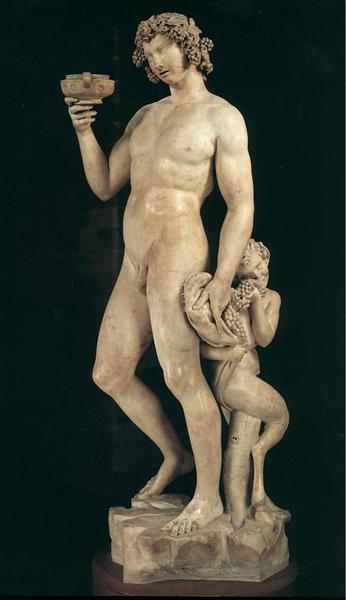“The Mariners transform’d to Dolphins” – Ovid

“Bacchus” (1497)
Michelangelo
_______
Him Pentheus view’d with fury in his look,
Pentheus, king of Thebes, if you’ll
remember, after Cadmus, his
grandfather, founder of Thebes
viewed, scanned, surveyed
And scarce with-held his hands, whilst thus he spoke:
with-held, withheld
“Vile slave! whom speedy vengeance shall pursue,
And terrify thy base seditious crew:
Vile slave, the zealous votary from
the last instalment, follower, acolyte
of Bacchus / Dionysus, who’d been
captured by Pentheus’ men instead
of the god himself
by exacting a speedy vengeance on
this [v]ile slave, Pentheus expects
to terrify the remaining elements of
the offending crew, the seditious
party of Bacchus / Dionysus
Thy country and thy parentage reveal,
And, why thou joinest in these mad Orgies, tell.”
where are you from, what are you
doing here, Pentheus asks
The captive views him with undaunted eyes,
And, arm’d with inward innocence, replies,
“From high Meonia’s rocky shores I came,
Of poor descent, Acoetes is my name:
My sire was meanly born; no oxen plow’d
His fruitful fields, nor in his pastures low’d.
meanly, poor, without adequate
means
plow’d, low’d, an interesting
rhyme, they’re called forced
or oblique rhymes
His whole estate within the waters lay;
estate, livelihood, Acoetes‘ father,
his sire, was a fisherman
With lines and hooks he caught the finny prey,
finny, having fins
His art was all his livelyhood; which he
Thus with his dying lips bequeath’d to me:
His art, the quality of his work
In streams, my boy, and rivers take thy chance;
There swims, said he, thy whole inheritance.
Acoetes will inherit at best his
father’s skill
Long did I live on this poor legacy;
‘Till tir’d with rocks, and my old native sky,
that of Meonia, see above
To arts of navigation I inclin’d;
arts of navigation, knowledge of
the open sea, the wider oceans
Observ’d the turns and changes of the wind,
Learn’d the fit havens, and began to note
The stormy Hyades, the rainy Goat,
The bright Taygete, and the shining Bears,
With all the sailor’s catalogue of stars.
Hyades, a cluster of stars, with their
own mythic origin story, grieving
nymphs cast upon the heavens,
augurs of rain,hence stormy
the rainy Goat, Capricornus, the
constellation
Taygete, a satellite of the planet
the shining Bears, Ursa Major
and Ursa Minor, or the Great
and the Little Bear, whose
origins you might remember
from The Story of Calisto
“Once, as by chance for Delos I design’d,
Delos, a Greek island
design’d, planned as a destination
My vessel, driv’n by a strong gust of wind,
Moor’d in a Chian Creek; a-shore I went,
Chian, of Chios, a Greek island
And all the following night in Chios spent.
When morning rose, I sent my mates to bring
Supplies of water from a neighb’ring spring,
Whilst I the motion of the winds explor’d;
Then summon’d in my crew, and went aboard.
Opheltes heard my summons,
Opheltes, a confederate apparently
and with joy
Brought to the shore a soft and lovely boy,
With more than female sweetness in his look,
hmmmm
Whom straggling in the neighb’ring fields he took.
he took, he apprehended
With fumes of wine the little captive glows,
And nods with sleep, and staggers as he goes.
“I view’d him nicely, and began to trace
Each heav’nly feature, each immortal grace,
And saw divinity in all his face,
I know not who, said I, this God should be;
But that he is a God I plainly see:
And thou, who-e’er thou art, excuse the force
These men have us’d; and oh befriend our course!
befriend, accord it your sympathy
Pray not for us, the nimble Dictys cry’d,